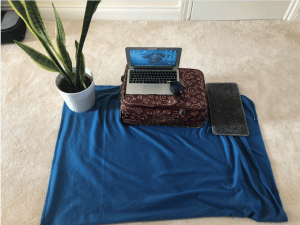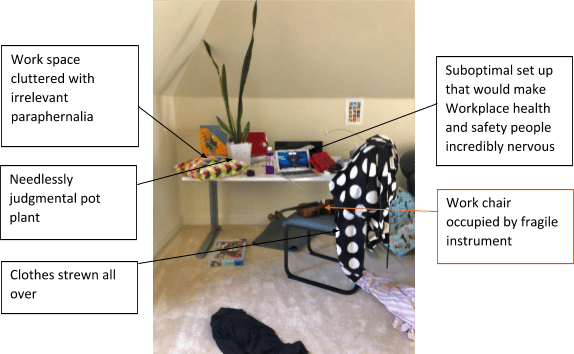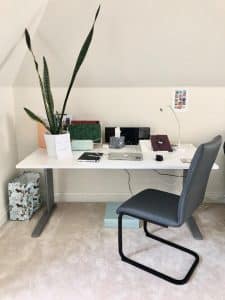By Lydia Chong
We are in the midst of a pandemic, the country is in lock down and the nation is hoarding toilet paper. Fear, stress and a sense of loss are completely natural reactions, especially for those who are on the frontline fighting against Coronavirus, as well as those who are vulnerable right now.
Even if you are not in the high-risk category, or a critical worker, you are likely subjected to a constant and nebulous dread that comes from uncertainty and lack of agency. If that is so, please keep in mind that you are not alone.
Women in Data asked me to put together a survival guide that contains (hopefully) helpful advice. This is a multipart guide exploring the various ways you can exercise control over your immediate environment (without resorting to doomsday prepping) such as:
- Working from home
- Maintaining physical and mental health
- Preparing for the worst
Most of this comes from scouring the internet, speaking with people, and my own experiences. There will be a list of resources you can access below. Additionally, we welcome feedback and suggestions as well as guest blog entries. Let us know if these tips help and what you are doing to cope.
Part 1: Working from home
Remote working, or working from home is nothing new. One of the earliest examples of remote working dates back to 1969, during the Apollo 11 mission. That’s right. In 1969, three blokes lived, worked and played inside a metal cylinder hurtling through SPACE. You possibly couldn’t get more isolated from the rest of humanity than being on the MOON. Given that the average smartphone has 1 million times the memory of the Apollo 11 computer, figuring out how to work from home is easy: this isn’t rocket science after all.
 (Source: NASA)
(Source: NASA)
Boundaries will preserve your sanity
The key to maintaining productivity and good mental health while working from home (even if you are addicted to your job), is to establish boundaries. Allowing work to bleed into your home life, and vice versa, may result in low level anxiety permeating through every aspect of your existence, resulting in bitterness towards your job. Even if work is your entire identity, you still need some boundaries.
1. Technical stuff
When I worked for a tiny engineering company in Australia, my colleagues were located 1000 to 2000 km way from me. I had a work phone, and a laptop that weighed as much as a Jack Russell terrier, but it was powerful enough to run AutoCAD, Matlab, SPSS and complicated multi-body dynamic simulation software without dying. With just these, and a power source, I have worked from home, cafes, airport lounges, and deserts: you name it.
A lot of companies have a virtual office, and smaller enterprises have a shared drive like Dropbox.
Also check the following if you haven’t already:
- Do you have enough data?
- Do you have all your software installed?
- How will you communicate with your colleagues during the day?
- Is your laptop or home computer set up for the task?
Making sure this is all sorted before you start, will remove a lot of stress, so you can get down to important and more urgent matters such as installing your new bidet.
2. Use Pavlovian conditioning to make your home office
Not everybody needs a study to set up a home office. If you have one, good for you! If you’re a plebe like me, you have a desk that you use for work, breakfast, study, Netflix and taxidermy, it can be difficult to induce the right mindset when you could be playing The Sims right now.
An office is effective because everything in that environment tells you it is ‘time to work’. Through
Pavlovian conditioning, you have come to associate the hum of the air-conditioning ducts, and being on the brink of hypothermia every time you step into the office, with productivity. This means you can easily enter that state with the following cues:
- Turning on a white noise generator to simulate HVAC noises.
- Using a distinctive table cloth ONLY when you’re working.
- Working on top of a rug, or blanket: see below for an example.
 The blue is a cue to sit down and make money. The plant is reminder to myself that plants exist. We need plants more than ever.
The blue is a cue to sit down and make money. The plant is reminder to myself that plants exist. We need plants more than ever.
- Placing hazard warning tape and bollards around you.
- Buy one of those lamps with different coloured LEDs: designate a colour that you only use whilst working.
Although half of these ideas are clearly silly, using a cue on a consistent basis will kick your brain into work mode, but the key is consistency.
For more specific advice, see the resources below. These also include recommendations for productivity apps and gadgets.
- Gretchen Rubin, ‘Coping with COVID-19: How to Work Productively from Home in a Time of Social Distancing.’ https://gretchenrubin.com/2020/03/coping-with-covid-19-work-from-home
- Thomas Frank, ‘Working from Home: How to Set Up Your Workspace’, https://youtu.be/tMTxikrSe8g
- Financial Samurai, ‘The Work From Home Survival Guide: Because Your Sanity Is Important’
https://financialsamurai.com/the-work-from-home-survival-guide-because-your-sanity-is-important/
So tell us, what does your work space look like? Please send us a picture so we can include it in a collage to post on the socials.
Now it doesn’t really matter where you work or what cue you use, but whatever you do…
3. Do not surrender to entropy
Look at the desk below. What’s wrong with this picture and how does it make you feel? Could you honestly be productive in that space? I wouldn’t taxidermy a hedgehog on that desk, let alone work a respectable corporate job!
 High entropy state rapidly degenerating into total chaos and self-loathing
High entropy state rapidly degenerating into total chaos and self-loathing
This doesn’t just happen overnight. It devolves over the course of two or three days and before you know it, you’re up to your eyeballs in dirty dishes and dead flowers. This can have an insidious effect on your mental state as the entropy spreads from your surroundings to your brain. The consequence of a highly entropic mind may be ‘brain-fog’, anxiety, rumination, or a dampening of your creativity or productivity.
Now I’m not trying to call anyone out, because we all generate entropy simply by doing stuff, but if that’s the case, what do we do about it? Some productivity gurus would suggest a clean desk policy at the end of the work day. Some take proactive measures by avoiding food and drink at work areas. Me? I just clean as I go or failing that, whenever my threshold for disorder has been reached.
In the next photo, there is an obvious decrease in entropy and this literally took 10 minutes. In this environment, there are opportunities for me to think, problem solve and create. Now this state isn’t permanent and you shouldn’t expect it to be, because, as I mentioned earlier, doing utterly anything creates disorder.
And what if you don’t have time or energy to do any of this? When I was a youth, I subscribed to the mantra ‘Nobody with anything interesting to do, has time to clean’. To some extent it’s true if your threshold for disorder is extremely high. If you really have more urgent matters to attend to and the mess doesn’t bother you, then this is not a priority for you… and that is okay!
 Orderly, low entropy state: ready to descend into chaos yet again.
Orderly, low entropy state: ready to descend into chaos yet again.
4. Ignore the agents of chaos
The Agents of chaos come in many forms; miniature humanoids, non-human freeloaders, other fully grown humans, and worst of all: YOU.
Ensure that whatever hours you choose to work, you stick to it. It’s easier said than done, and whilst you may be ace at time management in the office, this may be a challenge at home due to the aforementioned entities.
Make it known to every living organism in your immediate vicinity that you are AT WORK via email, megaphone, carrier pigeon, goats blood (use beetroot juice if vegan), or text message. This has the effect of deterring the agents of chaos from siphoning your productivity away with their endless demands for food, attention or both.
The best way to control these agents is to establish a routine. If you do have a well-meaning but irritatingly chatty acquaintance or adult family member who won’t stop making demands on your time, alienate them for eternity by calling them a ‘time bandit’.
The ultimate ‘time bandits’ are not human, they are not even corporeal: they are clever digital entities known to us as social media. Their main purpose for existence is to grab and retain your attention for as long as possible through any means necessary. Unless your job requires you to work with, or for a social media, best avoid them.
Remember, time is your only non-renewable resource. Guard it ferociously.
 Who can forget this hilarious moment when a live BBC interview was interrupted by the agents of chaos? Don’t be this guy. Don’t be Professor Robert Kelly.
Who can forget this hilarious moment when a live BBC interview was interrupted by the agents of chaos? Don’t be this guy. Don’t be Professor Robert Kelly.
5. Unless you live under a bridge, you have no business being a troll
It is far too easy to hang out in bum clothes all day. Perhaps, like me, your wardrobe is 80% bum clothes. Maybe your default state is troll, and you only wear nice clothes to assimilate with society.
Regardless, there are compelling reasons to look presentable. If nothing else, it acts as a cue to get you into the right mindset for work (See point 1) and it’s a small step towards gaining some semblance of control over your life.
This doesn’t mean you need to put on your best suit and a full face of makeup. Being presentable for me is wearing a pair of clean trousers and a shirt that doesn’t smell of dog farts. Maybe presentable for you is a freshly ironed, matching pajama set, full business suit or Samurai armor.
Wear whatever makes you feel sharp, smart and ready for that impromptu video call. That way you’re never caught off guard.

On a more serious note
At the end of the day, you will find what works for you. It is important to keep trying until you find the perfect set up and get into a routine. Your mood may fluctuate every half an hour between greatness and despair but that’s OK: reach out to people and have a chat. Yes, this pandemic is scary, and social isolation can be sad, but we are all in this together.
If it gets a bit overwhelming, take a break. Step away from your computer. Make yourself a cuppa. Water your plants. Finally, for some of us, working from home is a blessing, but for others it could be a major source of distress particularly for those who see their work place as an escape from a difficult domestic life. If you are having a hard time especially with domestic violence and abuse, please contact the National Domestic Abuse Helpline (details below), and check out the resources at the end of this article. Regardless of the situation, please reach out, and never suffer in silence.
National Domestic Abuse Helpline: Ph 0808 2000 247, https://www.nationaldahelpline.org.uk/
NHS mental health resources: https://www.nhs.uk/conditions/stress-anxiety-depression/mental-health-helplines/
